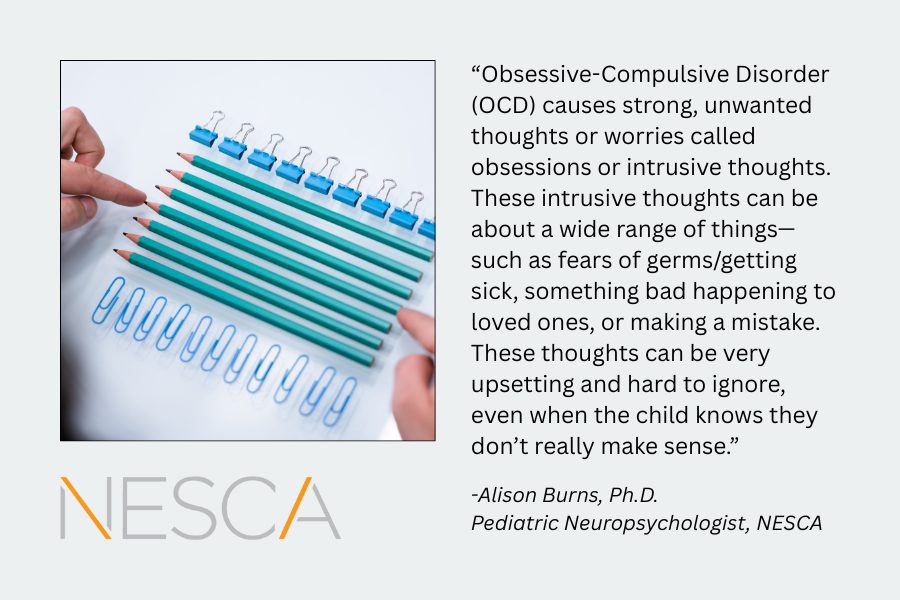
 By: Alison Burns, Ph.D.
By: Alison Burns, Ph.D.
Pediatric Neuropsychologist, NESCA
Obsessive-Compulsive Disorder (OCD) causes strong, unwanted thoughts or worries called obsessions or intrusive thoughts. These intrusive thoughts can be about a wide range of things—such as fears of germs/getting sick, something bad happening to loved ones, or making a mistake. These thoughts can be very upsetting and hard to ignore, even when the child knows they don’t really make sense. The anxiety caused by these intrusive thoughts can feel overwhelming and can take up a lot of mental energy.
To cope with these thoughts, children with OCD often develop compulsions—repetitive actions or mental rituals that they feel they must do to feel safe or to stop something bad from happening. These might include excessive cleaning, checking, counting, arranging items in a certain way, or asking for reassurance repeatedly. While these behaviors may temporarily relieve anxiety, they tend to reinforce the cycle of OCD and make it harder to break over time. Parents might notice their child spending a lot of time on these routines, getting very upset if interrupted, or struggling to keep up with school or social activities.
The good news is that OCD is treatable. The most effective therapy for children is a form of cognitive-behavioral therapy (CBT) called Exposure and Response Prevention (ERP), which helps them face their fears gradually while learning not to rely on compulsions. The Supportive Parenting for Anxious Childhood Emotions (SPACE) curriculum is a parent-focused program designed to help caregivers reduce accommodations of a child’s anxiety or OCD behaviors and promote healthy coping skills. Lastly, medication can also help reduce symptoms.
OCD must first be properly differentiated from other disorders that have overlapping symptoms, such as anxiety, autism spectrum disorder, or tic disorders. Anxiety disorders involve persistent worry, fear, or nervousness about real-life situations, whereas OCD is characterized by a cycle of obsessions and compulsions that the person feels compelled to perform. OCD and autism spectrum disorder can both involve repetitive behaviors or strict routines, but they differ in motivation, awareness, and broader patterns. In OCD, behaviors are driven by anxiety or fear. In autism, repetitive behaviors or routines are often comforting, sensory-driven, or based on special interests. Tics are sudden, brief, involuntary movements or vocalizations—such as blinking, throat clearing, or jerking—that are often preceded by a physical urge and relieved temporarily by performing the tic. While both tics and OCD can appear repetitive, tics are automatic and not driven by specific fears or beliefs, whereas OCD behaviors are purposeful responses to obsessive thoughts and aim to relieve anxiety. A comprehensive neuropsychological assessment will utilize a combination of interviews, observations, and standardized tools to understand the nature and impact of symptoms to ensure an accurate diagnosis and treatment plan.
About the Author
Dr. Burns conducts comprehensive evaluations of school-aged children, adolescents, and young adults with a variety of developmental, learning, and emotional difficulties. She has expertise in the evaluation of individuals following a concussion/mild traumatic brain injury and particularly enjoys working with individuals with attention (ADHD) and executive functioning (EF) difficulties. Dr. Burns is passionate about helping individuals and their families better understand their areas of strength and weakness and provides tailored treatment recommendations based upon that unique profile to make the evaluation most helpful for each client.
To book a consultation with Dr. Burns or one of our many other expert neuropsychologists, complete NESCA’s online intake form.
NESCA is a pediatric neuropsychology practice and integrative treatment center with offices in Newton, Plainville, and Hingham, Massachusetts; Londonderry, New Hampshire; the greater Burlington, Vermont region; and Coral Gables, Florida, serving clients from infancy through young adulthood and their families. For more information, please email info@nesca-newton.com or call 617-658-9800.

